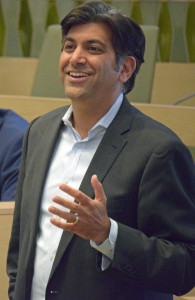DENVER, CO – Last Wednesday Aneesh Chopra, the former CTO of the United States and current CEO of Hunch Analytics, spoke with members of Prime Health about how Fast Healthcare Interoperability Resources (FHIR) could help make Colorado the number one digital health ecosystem in the nation. The discussion was held at the Anschutz Medical Campus and featured representatives from CORHIO, Kaiser Permanente, and Centura Health.
“If the Colorado digital health ecosystem were integrated through FHIR,” Prime Health’s CEO Jeffrey Nathanson said during his opening remarks, “it could become the nation’s top digital health ecosystem by allowing for the interconnection of the different electronic medical records present in the state.”
The event was co-hosted by RxRevu, a Colorado digital health company that had been among the first to adopt the FHIR standard. Led by Chopra, most of the discussion attempted to answer the question, “How can adoption of the FHIR standard enhance the collaboration and innovation that’s occurring in Colorado?”

Aneesh Chopra described the ability of FHIR to enhance collaboration in Colorado’s digital health ecosystem.
According to Chopra, FHIR offered healthcare providers “the necessary data structure for population health,” which – when matched with a management culture that respected startups and a research and development budget that enabled clinical staff to pursue innovative ideas – would allow providers to play a leading role in the current digital transformation of healthcare.
“This is a very important year to get as many of the building blocks in place as possible,” he explained.
FHIR, a set of data standards created by HL7 to streamline the exchange of electronic healthcare information, presented providers with an opportunity to use “APIs to build bridges across systems and improve patient access to their records,” which would in turn empower consumers to play a more active role in their healthcare.
“The best path to interoperability is an app in the patient’s hands,” Chopra told the members of Prime Health. “I should be able to connect a designated application to my medical record with the same ease with which I connect my Apple TV to my Netflix account.”
Carm Huntress, the CEO of RxRevu, elaborated on Chopra’s comments by discussing Clinical Decision Support Hooks, or CDS Hooks, which allowed third-party applications like RxRevu to integrate with EHRs. According to Huntress, interoperability measures like FHIR and CDS Hooks would play a crucial role in the current shift to value-based care.
“If you want to create a value-based healthcare system, this can’t happen unless you make the transition to interoperability,” he explained. “If we’re all living in our own little data siloes, nothing is going to change.”

Jackson Stevens (left) and Tynan Szvetecz of the Denver-based development studio Commerce Kitchen were among the attendees.
The second half of the event featured an open discussion between members of the audience and Chopra. The Former United States CTO fielded questions about FHIR and encouraged his audience to join the Argonaut Project, a collaborative endeavor between EHR vendors and healthcare providers intended to refine the FHIR standard.
According to Chopra, the willingness to collaborate of the Colorado digital health ecosystem positioned it to become a national leader in interoperability. But whether Colorado actually assumed that leadership role depended in large part on the members of its ecosystem embracing FHIR.
“Consider whether you want to be the community that sits this one out,” he told the audience in closing, “or the community that engages.”
Like the coverage that CyberMed News provides? Follow us on Twitter, LinkedIn, and Facebook to make sure you keep up to date on the most recent developments in digital health.







Be the first to comment on "Aneesh Chopra on Using FHIR to Become the Nation’s Top Digital Health Ecosystem"